当前城市:淄博[切换]
- 手机雅思无忧

扫码登录
雅思考试主要是通过对考生听、说、读、写四个方面英语能力的考核,综合测评考生的英语沟通运用能力,实现“沟通为本”的考试理念。对于雅思考生来说,也有很多考试难点和政策盲区需要帮助解答。今天雅思无忧网小编准备了文章2021年12月14日雅思写作解析:throw away society,希望通过文章来解决雅思考生这方面的疑难问题,敬请关注。
今天来解析下雅思写作题目,关于throw away society。关于这个雅思写作话题类似题目其实有很多,除了12月14日雅思写作刚考过的话题,还可以延展出其他题目,比如说:
1 类似题目>Nowadays people always throw old things away and buy news things, whereas in the past old things were repaired and used again. What causes this problem? What effects does the
phenomenon lead to? Give reasons for your answer and include any relevant examples from your own knowledge or experience.
2 类 似题目 >People now throw things away and buy new ones instead of repairing and using them again. What are the causes of this problem? What measures should be taken to deal with this
issue? Give reasons for your answer and include any relevant examples from your own knowledge or experience.
3 类 似题目 >We have developed a "throw-away" society and are filling the environment with many plastic bags and rubbish that we cannot fully dispose of. To what extent do you agree or
disagree with this opinion? What measures should be taken to combat the problem? Give reasons for your answer and include any relevant examples from your own knowledge or experience.
4 类 似题目 >People buy things and use them for a limited period of time and then, instead of repairing and using them again, throw them away to be replaced by new things. What are the causes of
this phenomenon? What measures should be taken to solve the problem? Give reasons for your answer and include any relevant examples from your own knowledge or experience.
5 类 似题目 >Nowadays we are said to have a "throw-away society" where we use things once and throw them away. Outline the problems that are caused by this lifestyle and what might happen
if we continue to dump large quantities of thrash. Propose some solutions to the issue. Give reasons for your answer and include any relevant examples from your own knowledge or experience.
全面回答 Example Writing:
Ours is a throw-away society strongly influenced by consumeri* as we value convenience over environmental protection. Even though we are environmentally conscious to some extent, we do not appear to be serious enough in taking measures to reduce consumption, let alone repairing and re-using old things instead of buying new ones. Much is known about what is happening whereas little is being done to effectively prevent the serious situation from becoming worse.
The causes of the development of the "throw-away society" are clear, so are its effects on the environment. We throw away out of convenience because societal conventions have us constantly move on to the next new fad or technology. For example, we are dumping large quantities of thrash, such as plastic bags and diapers that can pollute the environment. Likewise, we are discarding televisions, cell phones, computers and other plastics in exchange of new ones that unsurprisingly will become our future garbage. It is as if a product were designed or intended on purpose to fail or become less desirable over time, only to be thrown away after a certain amount of use. So much so, we are filling the environment with more rubbish than we can possibly dispose of, and as a result pollution is the price we are paying for the popular culture of consumeri* in the age of mass production.
Nevertheless, there are no ready solutions to consumeri*-related problems due mainly to the fact that the "throw-away" habits die hard, especially when often it could be more costly to repair old products than to buy new ones. Consequently, although many people have a critical view of over-consumption and excessive production of short-lived items, few people are actually able to resist the systematic attempts of business to make us wasteful as well as debt-ridden and permanently discontented individuals. To relieve the environmental impacts, we pretend to believe that one ideal solution should rest on educating consumers to voluntarily do "positive" buying--recycled and re-used. Without a doubt, this might be nothing but wishful thinking since such a measure is easier said than done in a well-to-do society, imagining that only extreme poverty could perhaps stop the "throw-away" trend. Fortunately, the good news is that there exist some kinds of technological know-how that may kindle the hope of finding a "green" solution, commonly called Waste-To-Energy (WTE) plants. Of course, it remains to be seen how efficiently those WTE plants can reduce waste volume and also contribute to resource recovery, thereby protecting the environment.
What with education and what with technology, it is expected that more could be done to combat the key problems in the "throw-away society". To be sure, environmental awareness alone is not enough to spare our planet from being further damaged if we do not change that consumer lifestyle which is not doing any favor to the environment. In a society gradually being used to obsessive consumeri*, the cruel reality is that too many people now prefer convenience to environmental protection, while too few measures are likely to become effective anytime soon.
获取更多雅思考试资讯、备考资料、寻找屠鸭战友,可添加雅思备考QQ群:903377701
编辑推荐:
(编辑:JIE)
以上就是雅思无忧网为您准备的访问雅思无忧网(https://www.yasi.cn/),了解更多雅思考试新消息,新动态。
 谢振礼雅思范文:The Throw-away Society 垃圾社会
谢振礼雅思范文:The Throw-away Society 垃圾社会
雅思考试主要是通过对考生听、说、读、写四个方面英语能力的考核,综合测评考生的英语沟通运用能力,实现“
2023年01月28日 14:12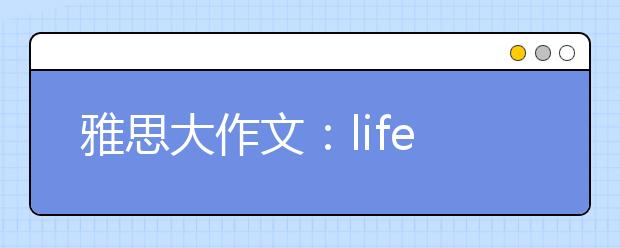 雅思大作文:life in a 'thrown-away' society
雅思大作文:life in a 'thrown-away' society
2020年雅思报考指南 雅思大作文题目:Nowad
2021年10月08日 18:13 雅思写作范文积累:Food From Far Away
雅思写作范文积累:Food From Far Away
雅思考试主要是通过对考生听、说、读、写四个方面英语能力的考核,综合测评考生的英语沟通运用能力,实现“
2023年01月03日 22:51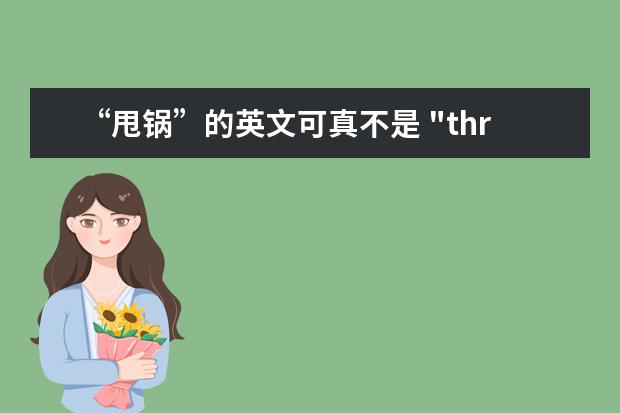 “甩锅”的英文可真不是 "throw the pot"噢!这“锅”可不背……
“甩锅”的英文可真不是 "throw the pot"噢!这“锅”可不背……
雅思考试主要是通过对考生听、说、读、写四个方面英语能力的考核,综合测评考生的英语沟通运用能力,实现“
2022年12月20日 14:39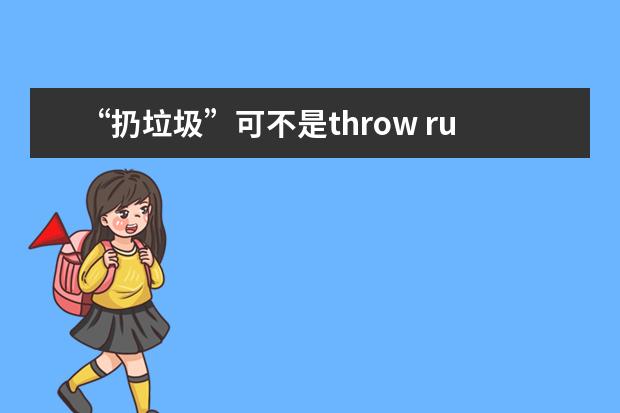 “扔垃圾”可不是throw rubbish!
“扔垃圾”可不是throw rubbish!
雅思考试主要是通过对考生听、说、读、写四个方面英语能力的考核,综合测评考生的英语沟通运用能力,实现“
2022年12月21日 09:33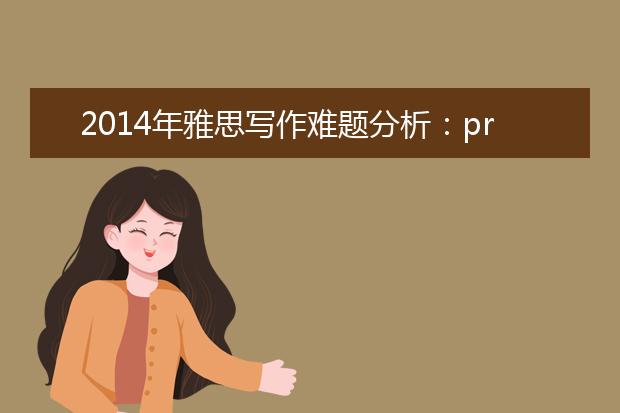 2014年雅思写作难题分析:produce a happier society
2014年雅思写作难题分析:produce a happier society
环球教育的老师从1-5月的雅思考中总结了雅思写作难题,下面来看下这篇produce a happie
2022年01月11日 10:14 让生词go away 雅思词汇量短期三步冲刺策略
让生词go away 雅思词汇量短期三步冲刺策略
雅思考试主要是通过对考生听、说、读、写四个方面英语能力的考核,综合测评考生的英语沟通运用能力,实现“
2023年03月03日 17:15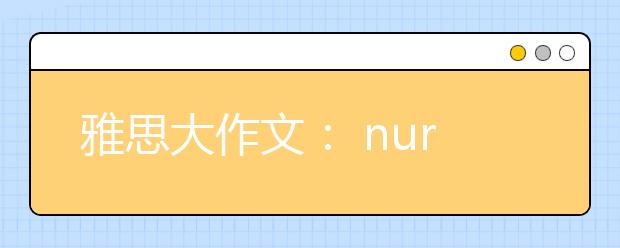 雅思大作文: nursing homes in modern society
雅思大作文: nursing homes in modern society
2020年雅思报考指南 雅思大作文题目:Nowada
2021年10月08日 18:03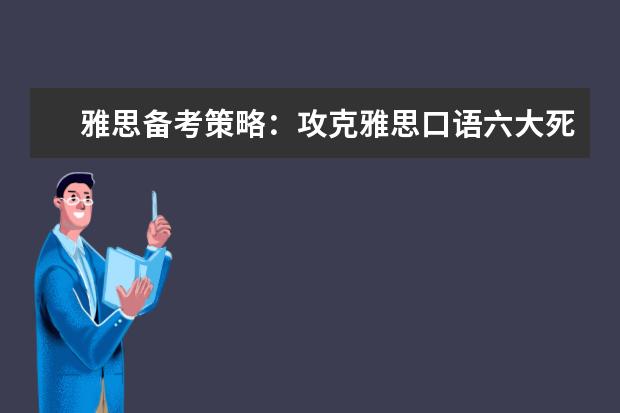 雅思备考策略:攻克雅思口语六大死穴的方法 society
雅思备考策略:攻克雅思口语六大死穴的方法 society
雅思考试主要是通过对考生听、说、读、写四个方面英语能力的考核,综合测评考生的英语沟通运用能力,实现“
2023年04月25日 05:51 浅析烤鸭们在雅思口语考试中的三大失分难点 society
浅析烤鸭们在雅思口语考试中的三大失分难点 society
雅思考试主要是通过对考生听、说、读、写四个方面英语能力的考核,综合测评考生的英语沟通运用能力,实现“
2023年04月20日 22:09